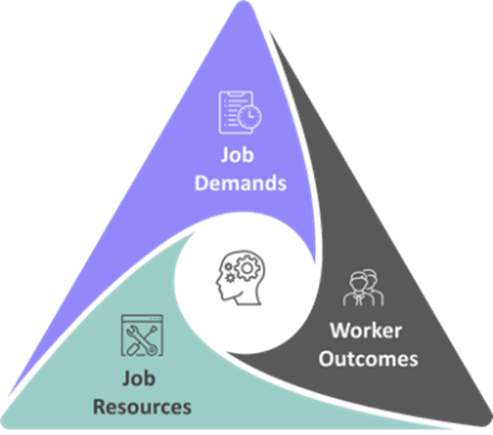The Health and Safety Index has several products, including the Psychosocial Dx diagnostic to enable organisations to measure, focus and act on improvements that matter.
We recently worked closely with a white collar (Organisation) to assist with a broad health “and” safety review, with a particular focus on mental health in the workplace.

Background
This Organisation completed the Psychosocial Dx survey to better understand job demands, job resources and worker outcomes of a remote sales team and office employees often involved in after-hours calls with regional teams across Asia. This diagnostic survey was completed by over 50% of the workforce predominantly by employees based in Australia.
The overall Psychosocial Dx result for Organisation was less than 70 or “Developing”. Positive experiences were identified with remote workers, respect for diverse cultures, and favourable workplace conditions. However, challenges stemming from work demands, management of change and job design, and work conflict significantly hindered overall psychosocial performance.
Job Demands
There were pressures at work for senior managers and the general workforce meeting work demands and expectations. While working across time zones was often considered unavoidable, it was made more challenging when compared with different cultural ‘work’ expectations in neighbouring countries across Asia. In addition, there were added safety issues of staff leaving premises or working out in the field late at night resulting in concerns for their personal safety.

Job Resources
The largest job resource challenges negatively impacting psychosocial performance related to the management of change, e.g., consulting on planned workplace changes and setting clear expectations during periods of change. For more information on expectations, refer to our blog ‘The Painful Impact of Unclear Expectations’
Open Feedback
Worker feedback from open questions supported survey data with variable levels of feedback around leave expectations, high-pressure from the “Region”, far too many meetings and meetings being too long.
Worker Outcomes
As a result, workers reported low performance in the areas of:
- Sleep
- Burnout
- Engagement
- Mental Health
- Leave Intention
The following questions had strong positive linear correlations identified the following outcomes:
Burnout Impact: My job regularly makes me feel burnt out.
• (r=0.67) I have difficulty finding time for my own health due to work demands.
Mental Health Impact: My job has an adverse effect on my mental health.
• (r=0.66) I often have conflicting job demands.
Immediate Solution Options
The Psychosocial Dx unique design not only help diagnose what is good and not so good, but also provide “Levers for Action“. These Levers are based on statistical correlated data to support organisations navigate the best Return on Investment (ROI).

Based on the Psychosocial Dx correlated Levers, it became clear the following options were areas of focus:
- Job Design: Evaluate job design to better understand demands impacting on workers, e.g. time pressures, social pressures, and conflicting demands.
- Clear Expectations: Senior leaders setting the tone on practices that would not only mitigate risk, but also promote a thriving workplace culture.
- Psychosocial Risk: Evaluate Psychosocial Dx survey results with key stakeholders to better manage risk.
For more information on our Psychosocial Diagnostic (Dx) survey, contact us.
